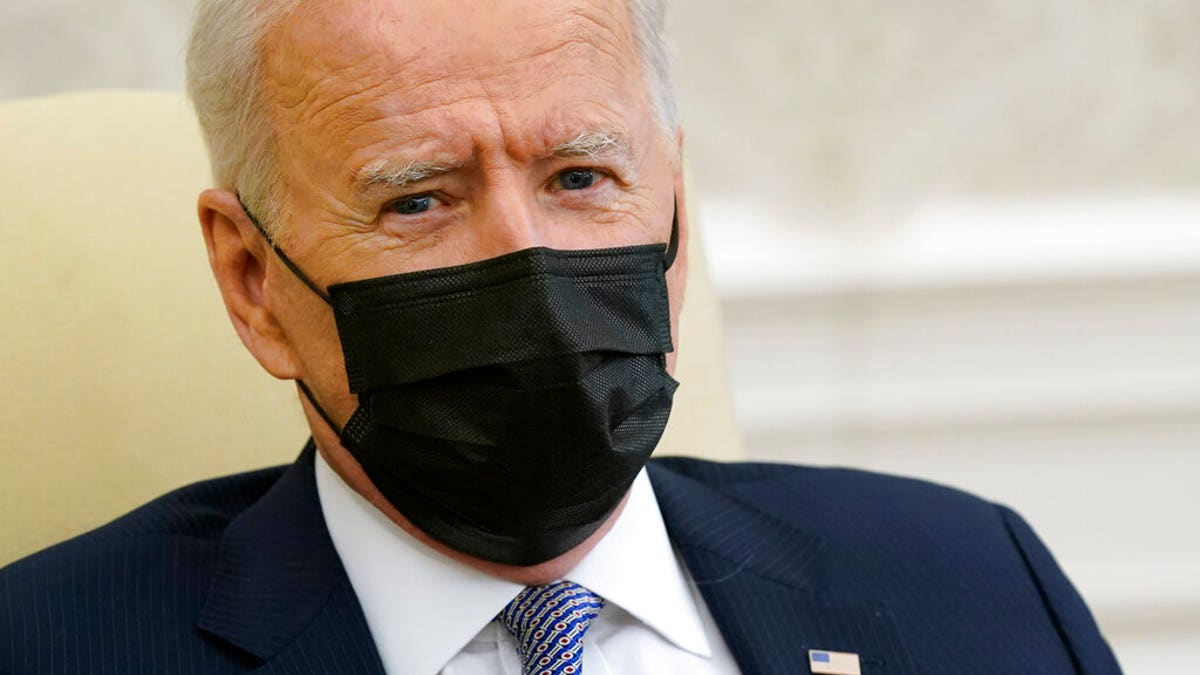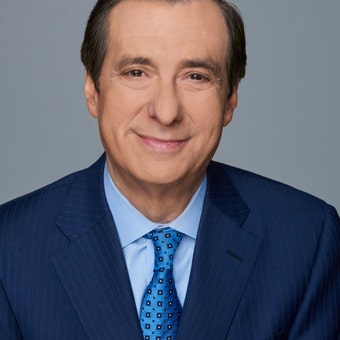Joe Biden, who campaigned as the man who reaches across the aisle, is poised to push through his second multi-trillion-dollar measure with no Republican votes.
But not to worry. The Biden word wizards have found a way to move the rhetorical goalposts.
They are redefining bipartisanship. And they come out and say it. In fact, they’re so determined to change the public perception that they’ve trotted out senior officials on the record.

President Joe Biden speaks during a meeting with lawmakers to discuss the American Jobs Plan in the Oval Office of the White House, Monday, April 12, 2021, in Washington. (AP)
The president himself has made this point, but since he carefully limits his public exposure, it hasn’t quite taken. White House officials are no longer hiding the fact that Biden rarely engages with the media, no longer saying he’s too busy with the pandemic to do interviews. They are owning it as a strategy, again with on-the-record interviews.
What a contrast, though, with his predecessor, who tried to dominate the media’s coverage hour by hour. While Biden spent the weekend, as he does most weekends, out of sight, Donald Trump was addressing an RNC gathering at Mar-a-Lago, calling Mitch McConnell a "dumb SOB" and "stone-cold loser," and unloading on such targets as Anthony Fauci and Brian Kemp.
Now that kind of name-calling is news, because McConnell is the most important Republican in Washington and this deepens the GOP civil war. But it’s also reminiscent of the quick-hit Twitter attacks that helped define Trump’s presidency, and is far easier to cover than the intricacies of Biden’s infrastructure package.
It’s still possible that Biden could cut an infrastructure deal—he met with lawmakers from both parties yesterday—but much more likely that he’ll use the same fast-track procedure that only requires Democratic votes.
Still, the Washington Post reports that the Biden team wants to broaden the definition of bipartisanship.
Senior adviser Anita Dunn told the paper: "If you looked up ‘bipartisan’ in the dictionary, I think it would say support from Republicans and Democrats. It doesn’t say the Republicans have to be in Congress."
Another senior adviser, Mike Donilon: "The Biden definition of bipartisanship is an agenda that unifies the country and appeals across the political spectrum."
And former Chicago mayor Rahm Emanuel added his voice: "What’s become crystal clear is that Biden has redefined bipartisan."
Simply declaring that, of course, doesn’t make it so. Imagine if Trump had pushed through not just his tax cuts but a second massive bill with just Republican votes. Would the media seriously entertain the notion that he was a bipartisan president?
I don’t dismiss the argument as crazy. Polls are showing significant Republican support for first the Covid law and now the infrastructure bill. Public approval of his handling of the pandemic is high. His initiatives do have some backing from state and local GOP officials. So if McConnell and Kevin McCarthy refuse to seriously negotiate, that doesn’t mean there are no Biden Republicans out there.
But it’s hard to truly claim the mantle of bipartisanship unless you can attract votes from at least some GOP lawmakers. In the past, presidents could use their personal popularity to pressure members of Congress. But these days neither party seems to pay a price for stiffing the opposition.
Another common pressure tactic employed by presidents was ye old media blitz.
BIDEN AIMS TO REDEFINE WORD 'BIPARTISAN' AS DEMS WORK TO PUSH SPENDING BILL WITHOUT ANY GOP VOTES
But that’s a tool Biden simply doesn’t use. He doesn’t personally try to win the news cycle or tweak the Twitterverse. As Politico points out:
"The president is not doing cable news interviews. Tweets from his account are limited and, when they come, unimaginably conventional. The public comments are largely scripted. Biden has opted for fewer sit-down interviews with mainstream outlets and reporters. He’s had just one major press conference—though another is coming--and prefers remarks straight to camera for the marquee moments. The White House is leaning more heavily on Cabinet officials to reach the audiences that didn’t tune into his latest Rose Garden event."
Conventional tweets from a president—can you imagine?
Deputy Communications Director Kate Berner is quoted as saying their strategy is based on digital innovation, local press and "effectively using traditional national media"—though that’s usually with Cabinet members such as Pete Buttigieg, who just did two Sunday shows. "He’s the president, he’s got a lot on his plate…We don’t let his schedule be a limiting factor for us."
Look, I get it. This is all about message discipline, about keeping Biden from wandering off script or committing a gaffe. If he does cable interviews, he may also be asked about the border or bipartisanship or his biting dog.
What’s more, Biden doesn’t want to be in people’s faces all the time like the former guy. He wants to keep the focus on policy and not his personality. And a president can do whatever he wants.
But missing from this story is any suggestion that Biden has a responsibility to the public to answer press questions. It’s just tossed off with "if it means criticism from the press and opponents about Biden’s availability, so be it." If the president belonged to, say, another political party, we’d be awash in quotes from outraged pundits.
CLICK HERE TO GET THE FOX NEWS APP
But hey, it’s early. When he hits a rough patch, as all presidents do, Biden may decide that he can’t just rely on surrogates to deliver a media message.












































